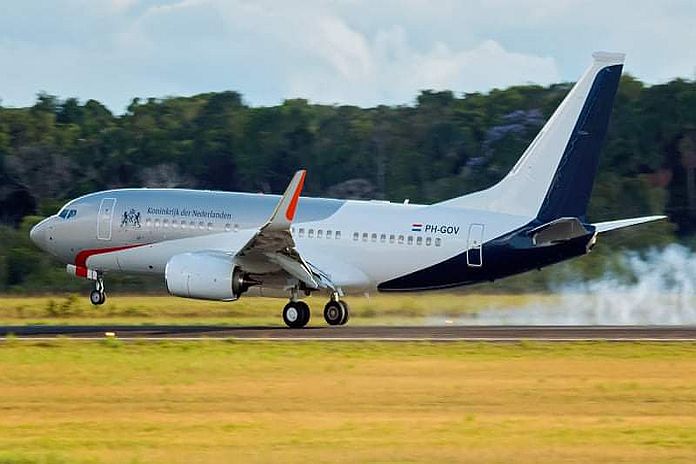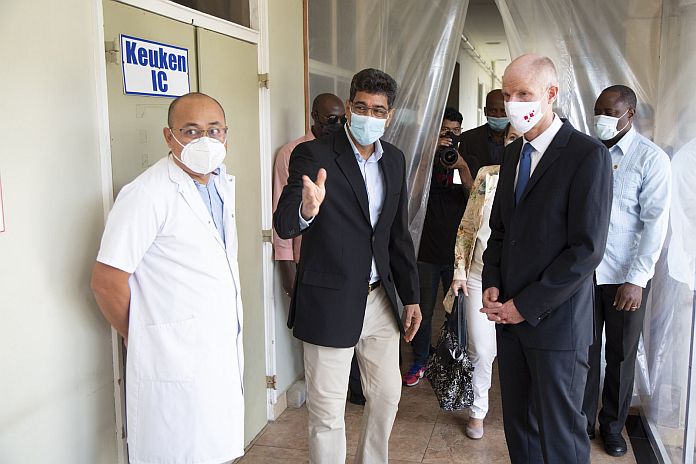By Ray Chickrie
PARAMARIBO, Suriname — Dutch foreign minister, Stef Blok, arrived in Paramaribo after a decade of poor relations between the Netherlands and Suriname for the 45th-independence anniversary of the former Dutch Colony. Frozen ties could be attributed to the former administration of president Desire Bouterse who was convicted in absentia by a Netherlands court for drug trafficking. Bouterse called the action a “political game” and accused the Hague “treating Suriname like a colony.”
Prior arrival in Suriname, minister Blok took in the Dutch Caribbean as part of the Suriname 45th independence anniversary visit. He arrived in Suriname on a Netherlands official government 737-700 jet from Curacao on Tuesday evening.

To underscore Holland’s support to the health sector of its former colony, the first order of business on Blok’s Wednesday agenda is a visit to the St Vincent Hospital which the Netherlands has continued to buttress since independence.
He wrote on Twitter, “Today at the Saint Vincent’s hospital in Paramaribo; seen how important cooperation is in the fight against #COVID. NL has made €6 million worth of personal protective equipment, like masks and gloves, and fans available to Suriname.”
The issue of slavery and the Dutch celebration of “Black Pete,” have been contested issues in their relations as well. A major Dutch Daily, the Volkskrant, commenting on Blok’s visit to Suriname wrote.
“As a colonial ruler of some three centuries, the Netherlands itself determined that in Suriname the indigenous population virtually disappeared, that enslaved Africans worked the plantations there, and that their work, after the abolition of slavery in 1863, was partly taken over by contract migrants from mainly British India and Indonesian Java: here are the ethnic lines.”
Only recently, and due to new leadership in Paramaribo, the two countries exchanged ambassadors after five years of frozen ties to the dismay of the Surinamese people. The previous government spent a great deal of money to advance old and new frontier ties with Bolivia, Nicaragua, Russia, Morocco, Serbia, Cuba and Venezuela. But the common person in the street and some government officials were dismayed and called for normal ties with Holland.
Dutch investments in education, healthcare, capacity building, and Dutch tourists form a major backbone of the Suriname economy. Remittances from Holland and the United States have cushioned the Surinamese economy for decades.
There is a large Suriname diaspora of about 450, 000 in the Netherlands today. Surinamese food is popular throughout the country and many Dutch people have visited Suriname. There are many interracial marriages among Dutch and Surinamese. Streets and places are named after Suriname throughout Holland. Suriname is a common subject in the parliament in the Hague. It is not difficult for Surinamese to visit Holland and most prefer to go further their studies there.
The new government headed by president Chandrikapersad Santokhi in opposition campaigned for strong ties with the Hague. However, while the former ruling party, NDP, promised to protest Blok’s visit, government officials and locals welcome the visit that will enhance Suriname and Netherlands historical ties.
In Paramaribo, Blok will have formal and informal talks with president Chan Santokhi and Guyana’s president Dr Mohammed Irfaan Ali.
Guyana and Suriname are now seeing unprecedented global attention; investors and new immigrants are coming to their shores because of major oil and gas findings that will create great wealth, businesses and jobs.
Guyana was also a former Dutch colony before the Treaty of Breda for Suriname. Guyana’s first capital was called Stabroek and many villages and towns in Guyana have Dutch names. Guyana’s second-largest city is named New Amsterdam. Most materials in its national archives are in Dutch and the Hague has been instrumental in restoring and translating these documents into English.





